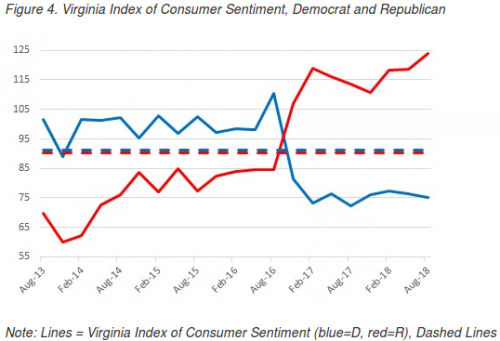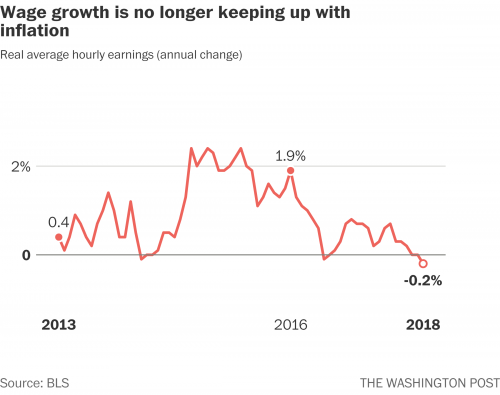How is the economy? Reality doesn't seem to matter
The consumer sentiment survey is supposed to be useful. It isn't.

In October 2016, only 28 percent of Republicans believed that the economy was improving. By May 2017, that number rose to 73 percent. Among Democrats, the inverse happened: In October 2016, 65 percent thought the economy was improving; by May 2017, only 35 percent did.
What happened in between that so dramatically altered how Democrats and Republicans each saw the economy? Donald Trump’s election and inauguration. Did Republicans truly believe that Trump’s presidency immediately and fundamentally strengthened the economy? And did Democrats really conclude that after Trump’s inauguration, the American economy was crushed almost overnight?
Obviously both Democrats and Republicans can't both be right.
Are regular people doing great, or are they declining?
It turns out that neither are right.

Cost of living was up 2.9 percent from July 2017 to July 2018, the Labor Department reported Friday, an inflation rate that outstripped a 2.7 percent increase in wages over the same period. The average U.S. “real wage,” a federal measure of pay that takes inflation into account, fell to $10.76 an hour last month, 2 cents down from where it was a year ago.
The stagnation in pay defies U.S. growth, which has increased in the past year and topped 4 percent in the second quarter of 2018 — the highest rate since mid-2014.
The economy for the working class is not significantly better or worse. It's the same story for the poverty rate as well.
On Wednesday, the Census Bureau released its 2017 annual report on the poor that offered a stark counterpoint, suggesting that the national recovery has bypassed many of the 40 million to 45 million Americans estimated to be living below the federal poverty level.While median household income rose 1.8 percent last year, the national poverty rate remained stubbornly high at 12.3 percent. That was just a slight decrease from the previous year’s level of 12.7 percent, according to the federal government’s most comprehensive annual gauge of economic hardship.
The supplemental poverty measure for 2017, widely regarded by economists as more accurate, was even higher, 13.9 percent in 2017, essentially unchanged from the year before.
The Trump administration is playing down the severity of poverty in the country, even declaring victory over poverty, because the Trump administration seeks to eliminate safety net programs.
That's why reality still matters.


Comments
"Will Work for Food"
signs about to proliferate.
TPTB, the Oligarchy, the punks that run this place, don't seem to get that when they take money out of poor peoples pockets they take money out of their Economy™, too. No money = no sales = no profits. Or... maybe they've got their spaceship ready for Mars.
the little things you can do are more valuable than the giant things you can't! - @thanatokephaloides. On Twitter @wink1radio. (-2.1) All about building progressive media.
And people with disabilities are fucked no matter what.
We'll never get a fair shake regardless of our choices in life, how much work we put in, how 'normal' we try to look for employers, the list goes on.
Economy doing better? Worse? I really don't give a shit.
Modern education is little more than toeing the line for the capitalist pigs.
Guerrilla Liberalism won't liberate the US or the world from the iron fist of capital.
You have missed the point. This is not an economic survey.
It is a Consumer Sentiment Survey. R's are optimistic and D'd are pessimistic-what a surprise.
When people expect a continuing "good" economy, they are more open to spending. Even if they have to borrow to do it.
I expect things to roll merrily along until the MF'ing financial wizards crash the whole thing again.
chuck utzman
TULSI 2020